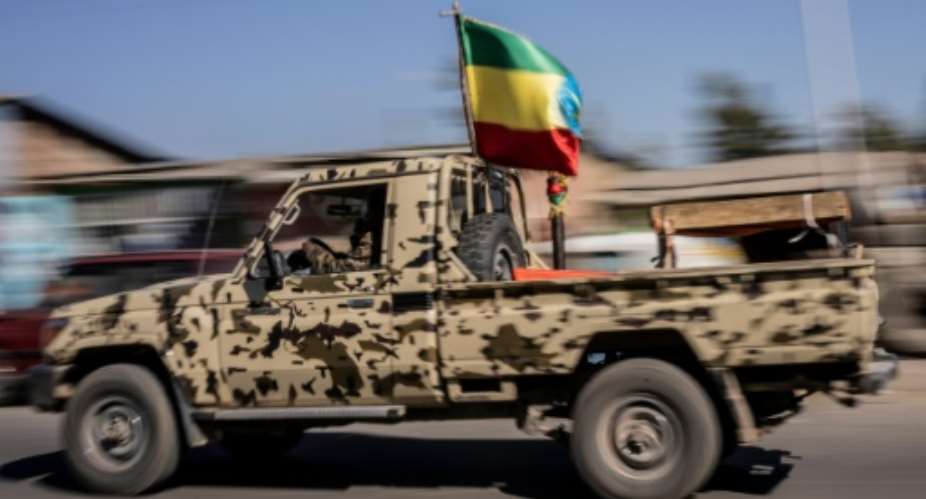Ethiopia on Friday rejected as "lies" claims of withdrawal by Tigrayan rebels from a region neighbouring war-wracked Tigray and accused them of trying to "impede" the delivery of aid.
The conflict between Prime Minister Abiy Ahmed's government and the Tigray People's Liberation Front (TPLF) erupted in November 2020.
The TPLF on Tuesday said it withdrew from Afar region under rebel occupation for nine months, fulfilling a key demand set by the government when it declared a humanitarian truce last month.
The TPLF is "trying to mislead the international community by pretending to have withdrawn from (the entirety) of Afar region", Legesse Tulu, Ethiopian government spokesman, told a press conference.
"Even though it has withdrawn from some border areas of Amhara and Afar regions, it has seized (other) geographically key areas, while it has continued to occupy other areas," Tulu said.
Both sides' claims could not be independently verified.
"The international media echoed these lies without cross-checking facts," said Ethiopian foreign ministry spokesman, Dina Mufti, in a separate press conference, referring to the rebels' claims of total withdrawal from Afar.
"The truth is that the TPLF forces have only withdrawn from a few areas of Eribti, Berehale, and Abala town while maintaining control of the surrounding areas of Abala affecting the aid corridor" through which aid flows to Tigray, as well as other areas in Afar and Amhara, he said.
The conflict began when Nobel Peace laureate Abiy sent troops into Tigray to topple the TPLF, the region's then ruling party, saying the move came in response to rebel attacks on army camps.
It followed months of seething tensions between the government and the TPLF, which had dominated politics in Ethiopia for three decades before Abiy came to power in 2018.
Humanitarian aid
The war has driven hundreds of thousands to the brink of famine, displaced more than two million people and left more than nine million in need of food aid, according to the United Nations.
After quickly toppling the TPLF, the federal army was driven out of Tigray in June 2021 by the rebels, which then advanced into Afar and Amhara before retreating to Tigray in December.
But rebels continued to occupy some areas of the two regions.
In March, Ethiopia's government declared "an indefinite humanitarian truce effective immediately", which allowed several convoys of humanitarian aid to reach the region for the first time since mid-December.
The UN previously blamed both sides for the "de facto humanitarian blockade".
 Map of Ethiopia locating the region of Tigray. By Aude GENET (AFP/File)
Map of Ethiopia locating the region of Tigray. By Aude GENET (AFP/File)
Legesse called on the international community "to continue its pressure... to make the (Tigray forces) leave from all areas it controls" in Afar and Amhara, accusing the rebels of "working hard to impede aid efforts".
Since April 1, 146 aid trucks have been able to enter Tigray, Mufti said, rejecting rebel claims that the government had limited the amount of aid supplied to the region.
Humanitarian organisations must however obtain permission from Addis Ababa and the Afar region for each convoy.
The UN World Food Programme this month said it was "ready to keep supplies flowing in at scale" after its latest convoy arrived in Tigray where six million people live.





 Lay KPMG audit report on SML-GRA contract before Parliament – Isaac Adongo tells...
Lay KPMG audit report on SML-GRA contract before Parliament – Isaac Adongo tells...
 Supervisor remanded for stabbing businessman with broken bottle and screwdriver
Supervisor remanded for stabbing businessman with broken bottle and screwdriver
 NDC watching EC and NPP closely on Returning Officer recruitment — Omane Boamah
NDC watching EC and NPP closely on Returning Officer recruitment — Omane Boamah
 Your decision to contest for president again is pathetic – Annoh-Dompreh blasts ...
Your decision to contest for president again is pathetic – Annoh-Dompreh blasts ...
 Election 2024: Security agencies ready to keep peace and secure the country — IG...
Election 2024: Security agencies ready to keep peace and secure the country — IG...
 People no longer place value in public basic schools; new uniforms, painting wil...
People no longer place value in public basic schools; new uniforms, painting wil...
 'Comedian' Paul Adom Otchere needs help – Sulemana Braimah
'Comedian' Paul Adom Otchere needs help – Sulemana Braimah
 Ejisu by-election: Only 33% of voters can be swayed by inducement — Global InfoA...
Ejisu by-election: Only 33% of voters can be swayed by inducement — Global InfoA...
 Minority will expose the beneficial owners of SML, recover funds paid to company...
Minority will expose the beneficial owners of SML, recover funds paid to company...
 Prof. Opoku-Agyemang has ‘decapitated’ the NPP’s strategies; don’t take them ser...
Prof. Opoku-Agyemang has ‘decapitated’ the NPP’s strategies; don’t take them ser...
